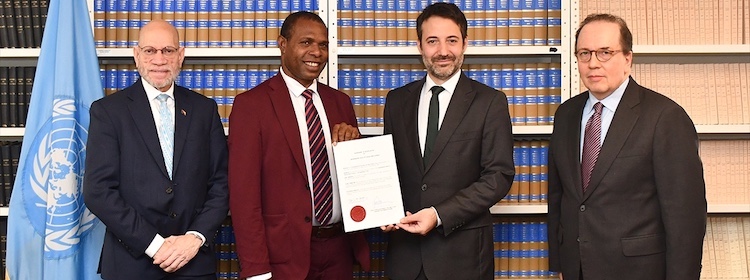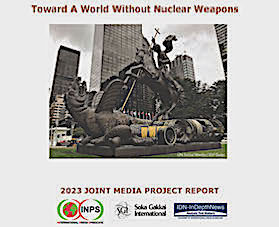NEW YORK | 16 March 2024 (IDN | CTBTO) — Papua New Guinea has become the 178th State to ratify the Comprehensive Nuclear-Test-Ban Treaty (CTBT). As a State Party to both the Treaty on the Non-Proliferation of Nuclear Weapons (NPT) and the Treaty of Rarotonga, Papua New Guinea had already committed to fulfilling the core obligation of the CTBT by refraining from conducting any nuclear explosions.
Papua New Guinea's ratification also marks a significant milestone towards universalising the Treaty in the Pacific region.
The official ratification was marked on 13 March 2024 with a Treaty ceremony at the United Nations Headquarters in New York. The event was attended by David Nanopoulos, the Chief of the Treaty Section at the UN Office of Legal Affairs, Ambassador Fred Sarufa, the Chargé d'Affaires of Papua New Guinea to the United Nations, and Jason Peter, the country's Minister for Community Development, Youth, and Religion.
Upon receiving the news, Robert Floyd, the Executive Secretary of the Comprehensive Nuclear-Test-Ban Treaty Organization (CTBTO), praised the country for "advancing global efforts for non-proliferation and disarmament".
CTBTO Executive Secretary Robert Floyd said: "I am thankful to Papua New Guinea for ratifying the CTBT, a crucial move especially relevant in the current climate. I also extend my gratitude to Prime Minister James Marape and Foreign Minister Justin Tkatchenko for their significant contributions throughout this process. Since day one, PNG has been a staunch supporter of our precious Treaty - as an early State Signatory and host of four International Monitoring System (IMS) stations."
The CTBTO head travelled to Papua New Guinea in November 2022, where he met with several officials, including Minister Tkatchenko.
While in Port Moresby, the delegation also met with organizations that are crucial in supporting the work of the CTBTO. This included the Department for Mineral Policy and Geohazard Management (DMPGM), responsible for operating the three IMS stations (AS075, AS076, and IS40), as well as personnel from the country's National Weather Service (NWS), who operate radionuclide station RN51.
"A ban on nuclear testing is one of the most useful tools to prevent the spread of nuclear weapons. The CTBT is thus a critical element in the global effort to prevent the spread of nuclear weapons and promote nuclear disarmament," said Izumi Nakamitsu, UN Under-Secretary-General and High Representative for Disarmament Affairs. [IDN-InDepthNews]
Photo: (L-R) Ambassador Fred Sarufa, the Chargé d'Affaires of Papua New Guinea to the United Nations 1st from links, Jason Peter, the country's Minister for Community Development, Youth, and Religion, David Nanopoulos, the Chief of the Treaty Section at the UN Office of Legal Affairs.
IDN is the flagship agency of the Non-profit International Press Syndicate













